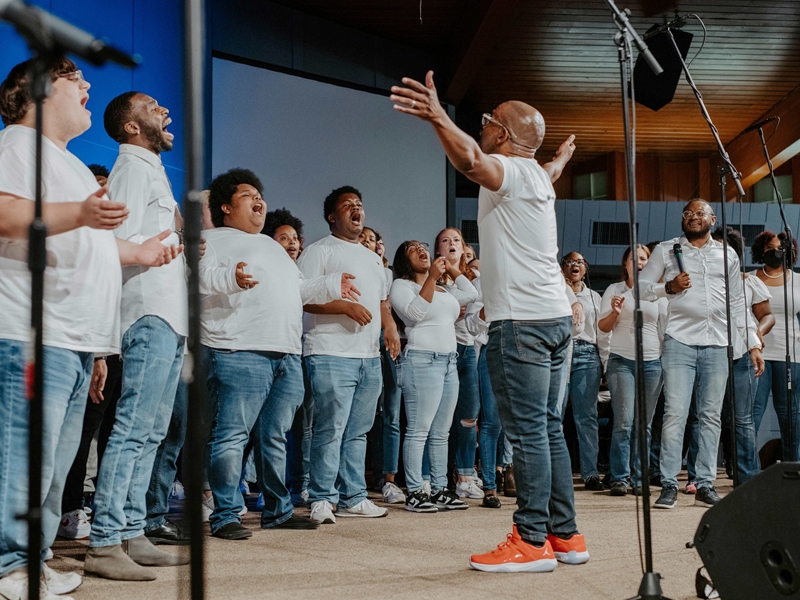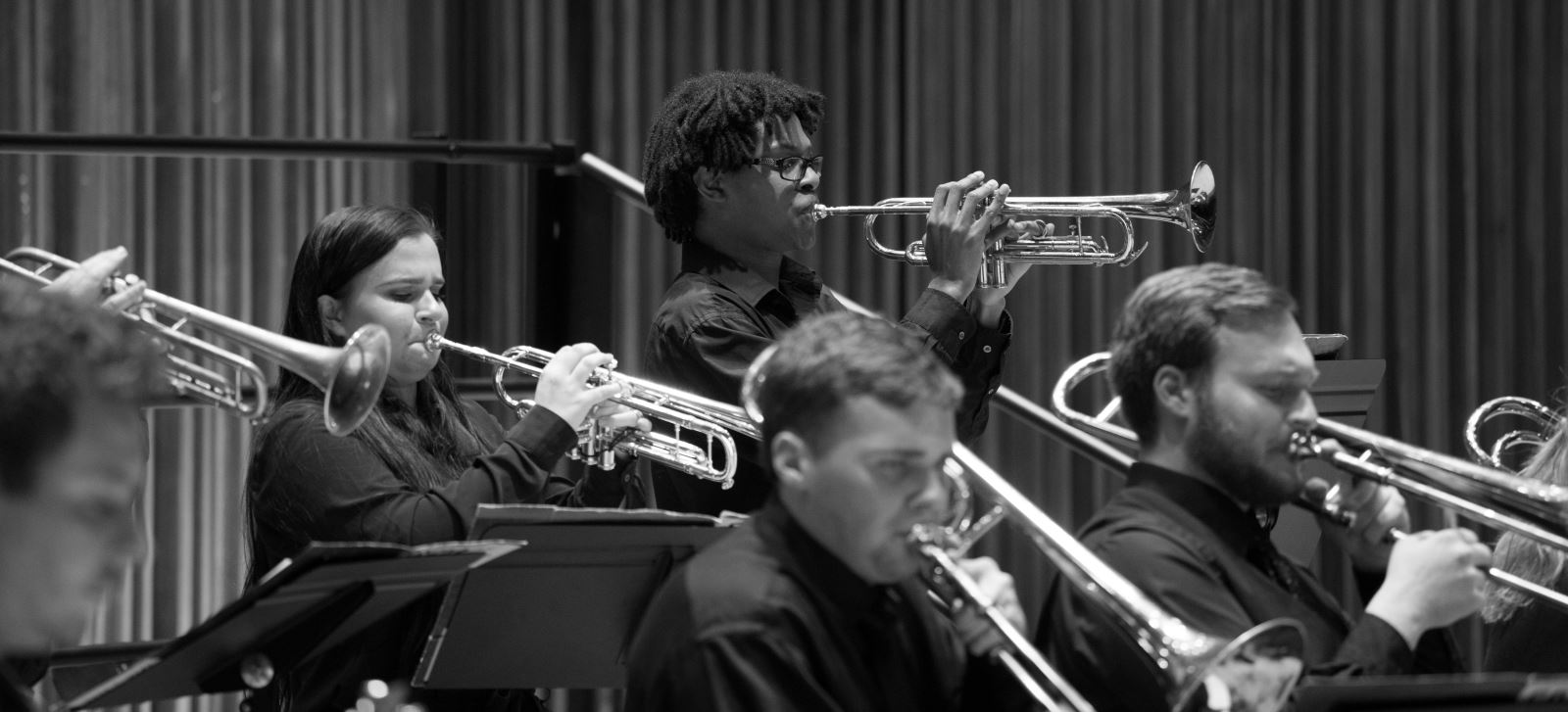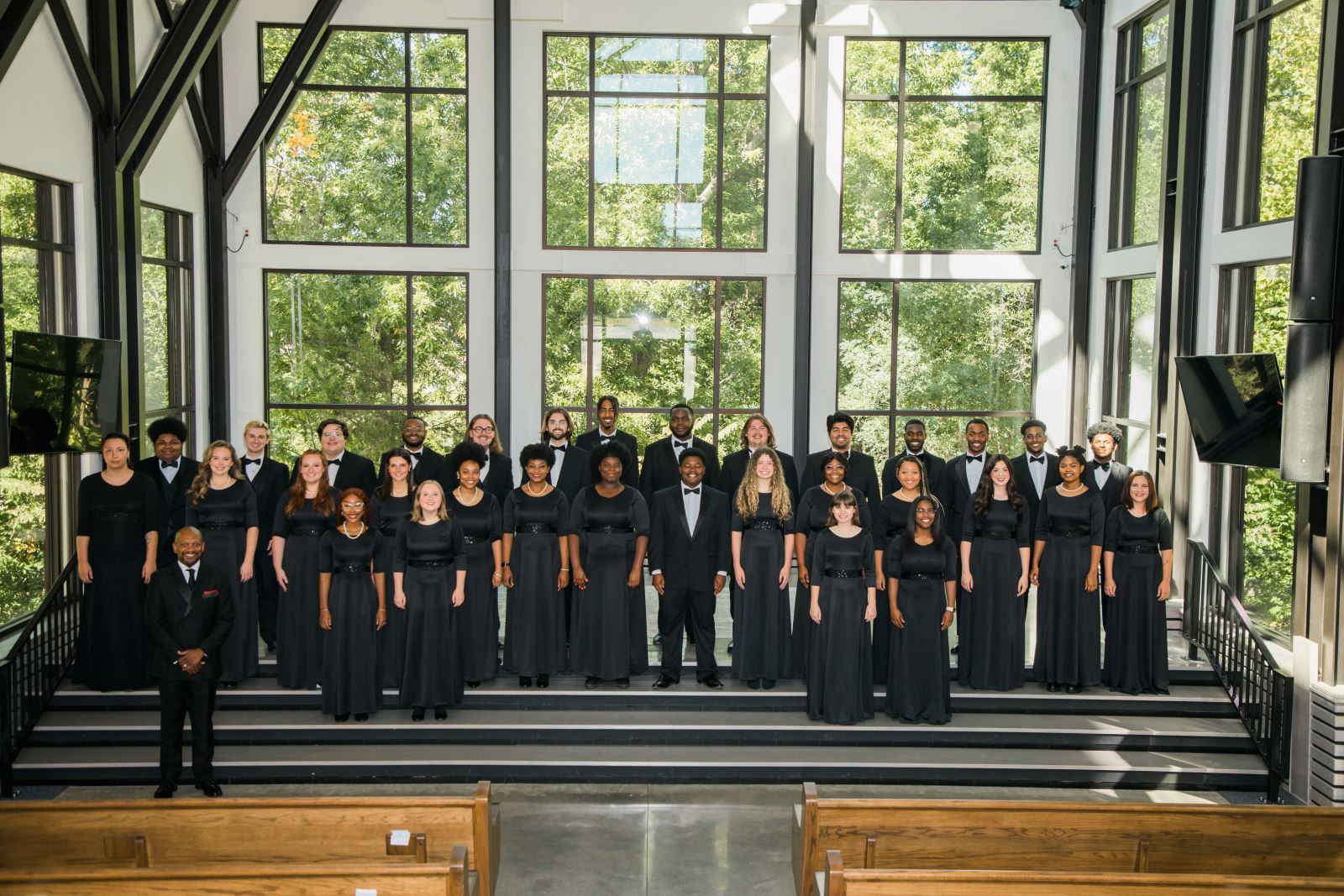
Through the generosity of the Alice L. Walton Foundation, the U of A is now the home of the Arkansas Center for Black Music, as well as the only Master of Music in Black Sacred Music degree in the United States.
Both the center and the new degree’s creation are being led by Grammy Award-winning educator Jeffrey Allen Murdock, who is also the U of A’s director of choral activities, an associate professor of music and conductor of the university’s renowned Inspirational Chorale.
“Black sacred music has influenced the lives of Black Arkansans for centuries,” Murdock said. “But historically, the performance of most music of African origin hasn’t been deemed eligible for quality academic study. I’m thrilled and so appreciative of the Alice L. Walton Foundation for helping us to amplify this and to celebrate the study of this musical tradition through the new degree and to ensure its future through the activities of the new center.”
The Arkansas Center for Black Music and the M.M. in Black Sacred Music were created with a gift of more than $848,000 from the Alice L. Walton Foundation to provide start-up costs for the center and degree, including recruiting and retaining top teaching talent and prospective students.
Murdock said the university and foundation chose this particular focus because of the U of A’s location, existing world-class resources in Black sacred music, pledge to belonging and commitment to leveraging these resources to expand access to the arts, which “is essential to building better futures in society.”
“Through both the center and degree, we aim to support students in Arkansas, and beyond, who may come to the university through untraditional paths. We want to honor their unique trajectories and ensure their capacity to thrive by improving access to graduate music programs,” said U of A Chancellor Charles Robinson.
Curtiss Smith, pastor of the Historic St. James Missionary Baptist Church near the U of A in Fayetteville, lauded the center and degree’s creation.
“Most forms of authentic American music are rooted in Black music of some kind, and Black sacred music in particular is linked to many of the social and cultural movements in Arkansas,” he said. “These initiatives are groundbreaking here in Arkansas and in the U.S., and I’m thrilled our very own Fayetteville will be at the epicenter.”
The projects are also a collaboration between the Department of Music and the African and African American Studies Program, which are both part of the U of A’s Fulbright College of Arts and Sciences.
“This partnership will allow us to bring together nationally recognized researchers and practitioners to create a one-of-its-kind hub for the study of a musical tradition that traces its roots back to the merging of American Christianity and the music brought to America by Black Africans of the Diaspora,” said Kathryn Sloan, interim dean of Fulbright College.
 University of Arkansas students perform in one of the university’s jazz ensembles.
University of Arkansas students perform in one of the university’s jazz ensembles.
About the Arkansas Center for Black Music
The Arkansas Center for Black Music’s mission is to advance the research, development and dissemination of Black music; the growth of leaders and scholars in this field; and the elevation of Black music in academic, professional and community music spaces.
Murdock, the center’s director, said that according to the National Core Arts Standards, music educators are required to teach music relative to history and culture, and that programs that involve singing and playing instruments should encompass a varied repertoire of music.
“The Arkansas Center for Black Music will allow our Department of Music to have these tenants at its core,” Murdock said. “In modern music programs, there is a growing trend among educators to work toward including all genres of music in the educational setting.”
The center will also host events like the annual Black Music Symposium, the UARK Jazz Festival and the Jazz Signature Series and performances by the U of A Inspirational Chorale and other campus groups.
“The Arkansas Center for Black Music will tremendously elevate our department’s profile, especially for our jazz program, by providing a forum for incredible events, master guest artists and opportunities for students and faculty to share their artistry and research,” said Jake Hertzog, assistant professor of music, head of the U of A’s jazz program and associate director of the center.
“We are so thrilled that the University of Arkansas will be a home for the next generation of artists and scholars in Black music in all its forms, from jazz to rock to gospel to hip-hop and beyond,” Hertzog added. “Through its artistic, research and service work, the center will nurture Arkansas musicians and researchers while attracting incredible talent from around the world. “
For more information about Arkansas Center for Black Music and its related events and research, please visit the U of A’s Department of Music online or the center online.
About the Master of Music in Black Sacred Music Degree
The new three-year, summer-only Master of Music in Black Sacred Music program will build on the center’s focus by delving into the study of Black sacred music, which is a unique and under-served academic and professional field with growing need.
“The M.M. is the first program of its kind in the U.S. and the only one offered at an SEC institution,” Murdock said. “Our program, which also provides scholarship support to select students, offers a pathway toward a wide range of careers in the field of Black sacred music.”
Hertzog added that “With our three-summer model, we have the unique opportunity to attract working professionals in the field and prepare students for top music positions in Black sacred music and sacred music in general.”
The duo said graduates of the M.M. in Black Sacred Music will be well prepared for a vast number of roles within the contemporary music industry, including but not limited to serving as: church musicians; worship directors; choir directors; gospel music performers; gospel songwriters; gospel recording artists; producers of gospel and related music like hip-hop, soul and R&B; teachers of Black sacred music in churches, K-12 and higher education; performers, arrangers and composers of popular and contemporary music like jazz, pop and hip-hop; and composers for film, TV, video games, apps and other media.
The Department of Music and the M.M. degree are accredited through the National Association of Schools of Music.
For more information about the Master of Music in Black Sacred Music degree or to apply, please visit the U of A’s Department of Music online or the degree online.
 The University of Arkansas’ Inspirational Chorale, led by Jeffrey Murdock, director of the Arkansas Center for Black Music.
The University of Arkansas’ Inspirational Chorale, led by Jeffrey Murdock, director of the Arkansas Center for Black Music.
National Support for the Center and Degree
Colleagues and practitioners throughout the U.S. have also voiced their support of both the U of A’s new Arkansas Center for Black Music and new Master of Music in Black Sacred Music degree.
“I have noticed a marked demand in Black sacred music course design that explores history, music analysis, repertoire, music industry and practicing,” said Alisha Lola Jones, Ph.D., university lecturer in music in contemporary societies at the University of Cambridge.
“This is the moment where the University of Arkansas can lead from the future by cultivating the rising tide of undergraduate and non-traditional practitioners and scholars seeking formal training in Black sacred music,” she added.
Rev. R. Janae Pitts-Murdock, senior pastor of the Light of the World Christian Church (Disciples of Christ) in Indianapolis, Indiana, added that the center and degree will both “support the continued development of skilled musicians capable of leading a well-rounded and genre-diverse Black sacred music program needed in congregations like mine across the country.”
“As a pastor of a historic Black congregation recently in need of a music minister, I have experienced first-hand the dearth of qualified practitioners,” she said. “I look forward to the great things that will come from this program and to my music staff participating.”
Likewise, Ryan Fisher, Ph.D., professor of music education and associate dean for academic affairs in the College of Communication and Fine Arts at the University of Memphis, said he “strongly believes this new program will attract numerous graduate students of color to the University of Arkansas and make the Department of Music THE primary training ground for future church musicians and music leaders in predominantly Black churches.”
About the Alice L. Walton Foundation: Founded in 2017, the Alice L. Walton Foundation works to enhance the quality of life for individuals through providing access to offerings that improve well-being and create diverse and inclusive communities. The foundation focuses on philanthropist Alice Walton’s commitment to increasing access to the arts, improving education outcomes, enhancing health and advancing economic opportunity for all. Through this work, the foundation strives to deliver meaningful and lasting change to individuals and communities most in need. Learn more at AliceWalton.org.
About the University of Arkansas: As Arkansas' flagship institution, the U of A provides an internationally competitive education in more than 200 academic programs. Founded in 1871, the U of A contributes more than $2.2 billion to Arkansas’ economy through the teaching of new knowledge and skills, entrepreneurship and job development, discovery through research and creative activity while also providing training for professional disciplines. The Carnegie Foundation classifies the U of A among the top 3% of U.S. colleges and universities with the highest level of research activity. U.S. News & World Report ranks the U of A among the top public universities in the nation. See how the U of A works to build a better world at Arkansas Research News.
Topics
Contacts
Jeffrey A. Murdock, director of the Arkansas Center of Black Music
Fulbright College of Arts and Sciences
479-575-5760, jeffreym@uark.edu
Andra Parrish Liwag, development writer
Fulbright College of Arts and Sciences
479-575-4393,
liwag@uark.edu